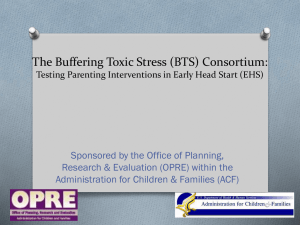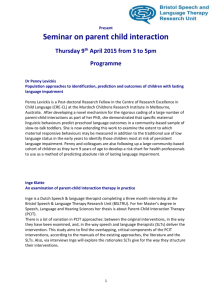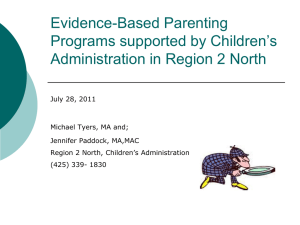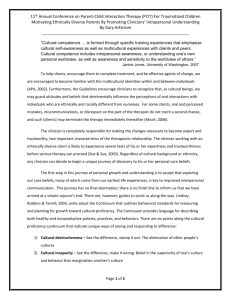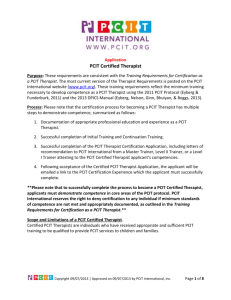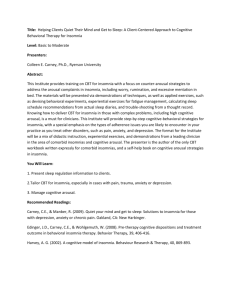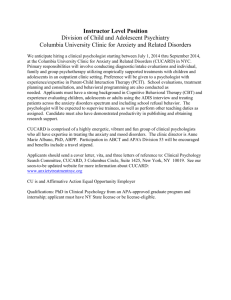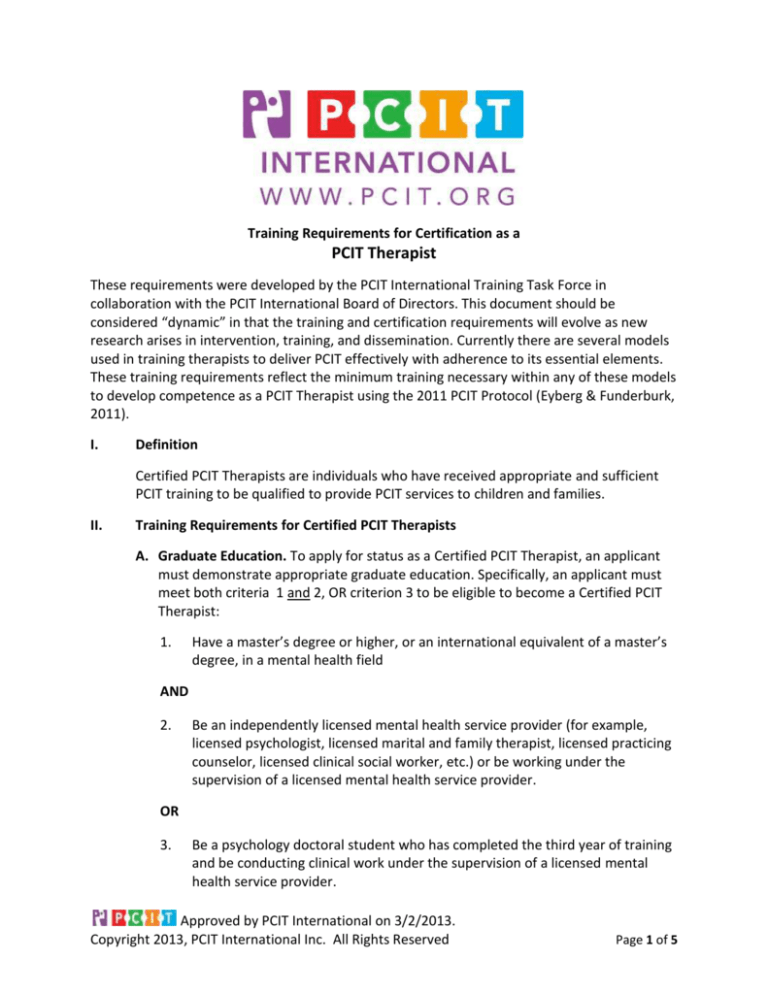
Training Requirements for Certification as a
PCIT Therapist
These requirements were developed by the PCIT International Training Task Force in
collaboration with the PCIT International Board of Directors. This document should be
considered “dynamic” in that the training and certification requirements will evolve as new
research arises in intervention, training, and dissemination. Currently there are several models
used in training therapists to deliver PCIT effectively with adherence to its essential elements.
These training requirements reflect the minimum training necessary within any of these models
to develop competence as a PCIT Therapist using the 2011 PCIT Protocol (Eyberg & Funderburk,
2011).
I.
Definition
Certified PCIT Therapists are individuals who have received appropriate and sufficient
PCIT training to be qualified to provide PCIT services to children and families.
II.
Training Requirements for Certified PCIT Therapists
A. Graduate Education. To apply for status as a Certified PCIT Therapist, an applicant
must demonstrate appropriate graduate education. Specifically, an applicant must
meet both criteria 1 and 2, OR criterion 3 to be eligible to become a Certified PCIT
Therapist:
1.
Have a master’s degree or higher, or an international equivalent of a master’s
degree, in a mental health field
AND
2.
Be an independently licensed mental health service provider (for example,
licensed psychologist, licensed marital and family therapist, licensed practicing
counselor, licensed clinical social worker, etc.) or be working under the
supervision of a licensed mental health service provider.
OR
3.
Be a psychology doctoral student who has completed the third year of training
and be conducting clinical work under the supervision of a licensed mental
health service provider.
Approved by PCIT International on 3/2/2013.
Copyright 2013, PCIT International Inc. All Rights Reserved
Page 1 of 5
B. Initial Training. To apply for status as a Certified PCIT Therapist, an applicant must
demonstrate appropriate Initial Training, as evidenced by:
1.
40-hours of face-to-face training with a PCIT Trainer that includes an overview
of the theoretical foundations of PCIT, DPICS coding practice, case
observations, and coaching with families, with a focus on mastery of CDI and
PDI skills, and a review of the 2011 PCIT Protocol. The 40 hours of training may
be conducted via didactic training, a mentorship model, or any combination of
the two.
OR
2.
10 hours of online training and 30 hours of face-to-face contact with a PCIT
Trainer. Online training must be supplemented with skills review from a PCIT
Trainer. Therefore, the 30 hours of face-to-face training may be conducted in
didactic training, a mentorship model, or any combination of the two. This
training will include an overview of the theoretical foundations of PCIT, DPICS
coding practice, case observations, and coaching with families, with a focus on
mastery of CDI and PDI skills, and a review of the 2011 PCIT Protocol.
C. Continuation Training. Following completion of initial training, Continuation Training
occurs over the course of approximately 1 year and focuses on active practice of
skills, addressing complex treatment issues (e.g., parent engagement), and an
assessment of coaching and coding skills (see competency requirements below). The
Continuation Training may be conducted in a workshop format, co-therapist model,
online training, or any combination of the three.
1.
Case Experience.
a. The applicant must serve as a therapist for a minimum of two PCIT cases to
graduation criteria as defined by the 2011 PCIT Protocol. At least one of the
cases must be conducted with the applicant as the primary therapist (e.g.,
lead therapist or equal co-therapist).
b. Until the two PCIT cases meet graduation criteria, the applicant must
remain in at least twice a month contact via real-time consultation (e.g.,
telephone conference or live, online, or telehealth observation) or video
review with a PCIT Trainer.
2.
Skill Review.
a. Applicants must have their treatment sessions observed by a PCIT Trainer.
Observations may be conducted in real time (e.g., live or online/telehealth)
or through video recording.
Approved by PCIT International on 3/2/2013.
Copyright 2013, PCIT International Inc. All Rights Reserved
Page 2 of 5
b. To demonstrate skill development, the applicant’s competence will be
observed by a PCIT Trainer in the following sessions conducted by the
applicant:
i.
ii.
iii.
iv.
CDI Teach
PDI Teach
CDI Coaching (ideally the first CDI coaching session), and
PDI Coaching (ideally the first PDI coaching session)
c. The PCIT Trainer will review these sessions and determine whether the
applicant has demonstrated mastery of each skillset; as such, the applicant
must be prepared to provide additional session observations as necessary
to document adequate skill.
D. Special Note Concerning Timing of Training: Students may receive PCIT training
before completion of their master’s degrees. However, they cannot be certified as
PCIT therapists until their master’s degree is complete or until they have completed
the third year of their doctoral training.
III.
Therapist Competency Requirements
A. Assessment Skills. By the end of the training process, the applicant should be able
to:
1.
Administer, score, and interpret the required standardized measures for use in
assessment and treatment planning. (Required measures: ECBI, DPICS-IV;
Recommended measures: TAI, PSI-SF, SESBI-R, and BASC or CBCL.)
2.
Administer behavioral observations from the DPICS-IV Coding System.
3.
Achieve a minimum of 80% agreement with a PCIT Trainer using the DPICS-IV
either during 5-minutes of live coding, or in continuous coding with a criterion
video recording.
B. CDI-Related Therapist Skills. By the end of the training process, an applicant should
be able to:
1.
Conduct the CDI Teach session, adequately explaining all non-optional items on
the treatment integrity checklist in the 2011 PCIT Protocol as observed by the
PCIT Trainer.
2.
Meet the parent criteria for CDI skills (10 labeled praises, 10 behavioral
descriptions, 10 reflections; 3 or fewer negative talks, questions, plus
commands) in a 5-minute interaction with a child or a 5-minute role-play with
an adult portraying a child.
Approved by PCIT International on 3/2/2013.
Copyright 2013, PCIT International Inc. All Rights Reserved
Page 3 of 5
3.
Demonstrate for the PCIT Trainer how to determine the coaching goals for a CDI
session by interpreting the DPICS-IV Coding Sheet data gathered at the start of
the session.
C. PDI-Related Therapist Skills. By the end of the training process, an applicant should
be able to:
1.
Present the PDI Teach Session, adequately explaining all non-optional items on
the treatment integrity checklist in the 2011 PCIT Protocol as observed by the
PCIT Trainer.
2.
Effectively manage a PDI Coach session and accurately demonstrate the
discipline sequence with a child in treatment. In the case when a full discipline
sequence does not occur or cannot be video recorded, the applicant must
demonstrate the skills through role-play.
3.
Accurately explain the House Rules procedure as described in the 2011 PCIT
Protocol. Accuracy can be assessed through role-play, and does not require
observation of an actual session. However, the PCIT Trainer must observe the
role-play in real time (e.g., live or online/telehealth) or by video recording.
4.
Accurately explain the Public Behaviors procedure as described in the 2011 PCIT
Protocol. Accuracy can be assessed through role-play, and does not require
observation of an actual session. However, the PCIT Trainer must observe the
role-play in real time (e.g., live or online/telehealth) or by video recording.
D. General Coaching Skills
IV.
1.
By the end of the training process, an applicant is expected to demonstrate
adequate and sensitive coaching as observed by the PCIT Trainer.
2.
By the end of the training process, an applicant is expected to model CDI skills
during all interactions with parents and children throughout the treatment.
Application Requirements
A. Upon completion of Initial and Continued Training, an applicant for Certified PCIT
Therapist status must complete the Certified PCIT Therapist Application (available
from PCIT International Certified Trainers or at PCIT International Therapist
workshops). (A list of PCIT Certified Trainers can be found at www.pcit.org.)
B. Following acceptance of the Certified PCIT Therapist Application, the applicant must
successfully complete the PCIT Certification Experience (which is available at
www.pcit.org).
C. Final decisions about certification of PCIT Therapists will be made by PCIT
International.
Approved by PCIT International on 3/2/2013.
Copyright 2013, PCIT International Inc. All Rights Reserved
Page 4 of 5
V.
Responsibilities of Certified PCIT Therapists
A. Use the 2011 PCIT Protocol and 2013 Clinical Manual for DPICS-IV as disseminated
by PCIT International.
B. Remain current in PCIT research by activities such as attending conferences, reading
research or practice articles, or conducting research.
C. Certified PCIT Therapists are required to obtain at least 3 hours of PCIT Continuing
Education credit every 2 years through educational activities sponsored by the PCIT
International Task Force on Continuing Education. PCIT International, Inc. is
approved by the American Psychological Association to sponsor continuing
education programs for psychologists. PCIT International, Inc. maintains
responsibility for this program and its content.
D. PCIT International is an APA-approved CE sponsor and provides continuing PCIT
education through its online educational and conference programming.
VI.
Maintaining Certification
A. Certification Period. Therapists are certified for 2 years from the beginning date on
their Certified PCIT Therapist Certificate.
B. Re-Certification. Certification as a PCIT Therapist is renewable every 2 years. To
renew, Certified PCIT Therapists must submit a brief application for re-certification
and document successful completion of 3 hours of PCIT Continuing Education in
programs of learning that have been preauthorized by PCIT International.
Certification Experience scores are required only for the initial certification process.
Approved by PCIT International on 3/2/2013.
Copyright 2013, PCIT International Inc. All Rights Reserved
Page 5 of 5

